#Haakim
Text

“Lock The Doors.”
All. His. Fault.
Marked Knee barely looked up from his own lap when the mission control doors slammed. “Lock the doors,” Cherry Berry’s authoritative voice called out. “Occupant, give me your headset.”
A Bad Day in Mission Control, from the fanfic Changeling Space Program.
Deviantart version here.
#My Little Pony#Friendship Is Magic#Twilight Sparkle#Haakim#Amira#Neighbuchadnezzar#Cherry Berry#Occupant#Dragonfly#Marked Knee#Changeling#Changeling Space Program#SFW
16 notes
·
View notes
Text
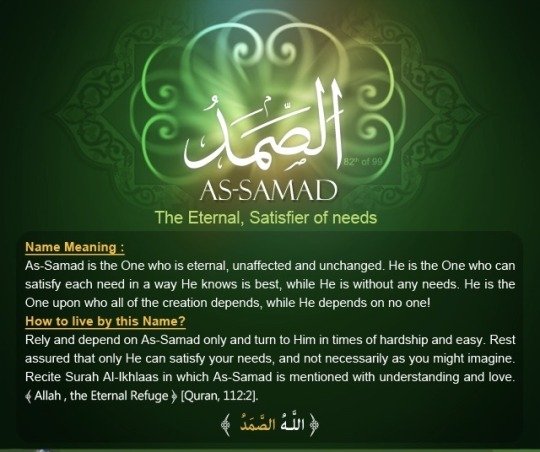
Allah calls Himself As-Samad— The Eternal, Satisfier of Needs, the Refuge and Absolute— on one occasion in the Quran. As-Samad is the unchangeable one on whom the entire creation depends. He is the one unaffected by any circumstance and the only one able to fulfil all needs in the most perfect way, without Himself being in need of anything or anyone!
The Eternal, Everlasting Refuge, Satisfier of All Needs
Samad comes from the root saad-meem-daal, which points to two main meanings. The first main meaning is to reach or attain, or to aim toward something. The second main meaning is to turn to and to need, and the third is to remain unchanged and unaffected. The fourth main meaning is to be everlasting and eternal.
This root appears just once in the Quran, as the noun samad. The example is al-samadu (“The Eternal, Absolute”).
Linguistically, samad means something that is not affected by circumstances or something that is solid. Sumood refers to the concept of being firm and steadfast.
As-Samad is the the One who is not changed nor affected by anything in the creation, He is the eternal and absolute refuge to seek and depend on for all needs and desires.
As-Samad Himself says: Say, ‘He is Allah , [who is] One, Allah , the Eternal Refuge. He neither begets nor is born, nor is there to Him any equivalent.’ [Quran, 112:1-4]
A description of Allah
The only place in the Quran Allah ‘azza wa jall calls Himself As-Samad is in Surah Al-Ikhlaas; the virtuous surah mentioned in the authentic hadith in Muslim to equal one-third of the Quran. This short, but amazingly beautiful and profound surah is a description of Allah Himself, His Oneness, His samad’yyah and His incomparability. Allah revealed this surah as a powerful answer to the people of Makkah who asked the Prophet salallahu ‘alayhi wa sallam to describe His Lord and His ‘lineage.’
What is ikhlaas (sincerity)? It is doing deeds purely for Him and to seek His pleasure, because He is Al-Ahad, the One and Unique. It is turning to Him for our needs and desires and desire Him only, because He is As-Samad, The Eternal and Satisfier of Needs, and it is to live by the fact that there is no one equal to Him in any of His attributes!
How can you live by this name?
1. Recite and live by Surah al-Ikhlaas.
Recite Surah Al-Ikhlaas often to gain reward, but not only that; learn to understand each word and live by the names of Allah mentioned in it. Love to recite this surah and talk about it to others as you are describing your Lord. Learn how to correctly recite it and convey it to at least one other person and teach your children the history and/or tafseer (explanation) of this virtuoussurah in which As-Samad is mentioned in order to instil love of Allah in their hearts.
2. Realize your dependence on Him.
One of the meanings of As-Samad is the One who is independent and self-sufficient. If you look at a manager, for example, one who has a high position with authority over others, it still takes one note from his superiors to end his career. This person is not samad. Then look at what we need tu survive as human beings; air, water, food, and even love. Why do we often act like as if we are independent? Especially during good times when we are healthy and wealthy we tend to forget we are even dependant on As-Samad for the strap of our shoe. So remind yourself daily that you are dependent on Him.
3. Call upon Him.
Here’s a beautiful supplication the Prophet salallahu ‘alayhi wa sallam used to make as part of the morning:
“يَا حَيُّ يَا قَيُّومُ بِرَحْمَتِكَ أَسْتَغِيثُ أَصْلِحْ لِي شَأْنِي كُلَّهُ وَلَا تَكِلْنِي إِلَى نَفْسِي طَرْفَةَ عَيْنٍ”.
O Ever Living One, O Eternal One, by Your mercy I call on You to set right all my affairs. Do not place me in charge of my soul even for the blinking of an eye (i.e. a moment). [Al-Haakim, saheeh] Memorize this dua’ and say it with true desire, fully realizing your dependence on As-Samad!
4. Desire As-Samad.
Turn to As-Samad in good and bad times and rely on Him, resting assured He is the Eternal Refuge and the One who will satisfy your needs in the way He knows is best for you. If you truly believe in As-Samad, your strongest desire will be to meet Him and your only fear will be that of His displeasure. So strive to be a real servant of Allah. The disbeliever is a slave of his desires, or of fashion, his belly, and his money. So beg Him to decrease the love for this world in your heart, including love of being praised by people, and replace it with a firm desire for His pleasure alone.
Wallahu ta’alaa ‘alem
O Allah, As-Samad, we know that You are the only Eternal Refuge. Make us realize we need you at all times and aid us to be of those who turn to You only for our needs. Adorn us with a strong desire to please You alone, ameen!
#allah#islam#revert help team#asma al husna#revert help#muslim#ayat#daily#allah’s name#dua#pray#prayer#salah#muslimah#hijab#religion#reminder#mohammed#new muslim#new revert#new convert#how to convert islam#converthelp#convert islam#become a muslim#welcome to islam#daily ayat#prophet#god#revert
39 notes
·
View notes
Text
The Prophet Muhammad (ﷺ) said:
“Faith wears out
in the heart of any one of you
just as clothes wear out,
so ask Allaah to renew the faith in your hearts.”
{Reported by Al-Haakim in Al-Mustadrak, ¼. As-Silsilah As-Saheehah, 1585}
72 notes
·
View notes
Text

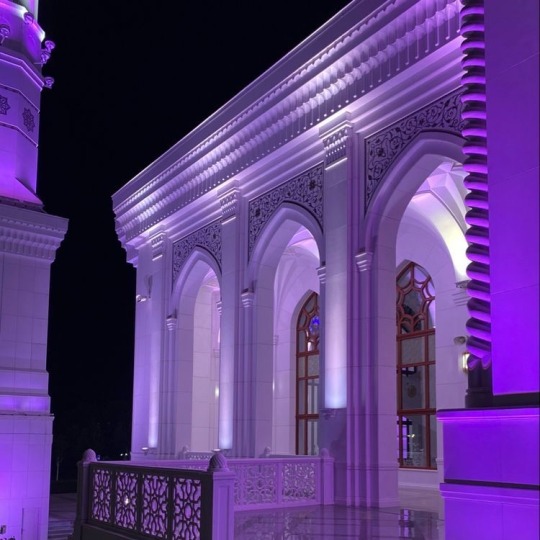

Khushoo’ in Salah
(Part 4)
The means of developing Khushoo’
4. Thinking about the aayaat and adhkaar being recited during the prayer and interacting with them.
The Qur’aan was revealed to be pondered over. Allah says (interpretation of the meaning): “(This is) a Book (the Quraan) which We have sent down to you, full of blessings that they may ponder over its Verses, and that men of understanding may remember.” [Saad 38:29]. No one can ponder over its verses unless he has some knowledge of the meaning of what he is reciting, so that he can think about it and be moved to tears by it.
•Another way of helping oneself to ponder over the meanings is to repeat aayaat, because this will help one to think deeply and look again at the meanings.
•Another way of helping oneself to ponder over the meanings is to memorize Quraan and various adhkaar to be recited during different parts of the prayer, so that one may recite them and think about their meanings.
5. Pausing at the end of each ayah:
This is more helpful in understanding and thinking about the meaning, and it is the Sunnah of the Prophet ﷺ , as Umm Salamah (رضي اللّٰه عنه ) described how the Messenger of Allah ﷺ would recite, “Bismillah il-Rahmaan il-Raheem”, and according to one report, he would pause, then say, “Al-hamdu Lillaahi Rabbi‟l- „Aalameen, al-Rahmaan, al-Raheem.” Then according to one report, he would pause, then say, “Maaliki yawm il-deen,” and he would break up his recitation ayah by ayah. (Reported by Abu Dawood, no. 4001; classed as Saheeh by al-Albaani in al-Irwaa‟, where its isnaads are described. 2/60).
•Pausing at the end of each ayah is Sunnah even if the meaning continues into the next ayah.
•Reciting in slow, rhythmic tones (tarteel) and making one’s voice beautiful when reciting. The Prophet (peace and blessings of Allah be upon him) “would recite a surah in such slow rhythmic tones that it would be longer than would seem possible.” (Reported by Muslim, no. 733).
•Another way of helping oneself to have khushoo’ is by making one’s voice beautiful when reciting. This is something that was advised by the Prophet ﷺ , as when he said, “Beautify the Qur‟an with your voices, for a fine voice increases the Quraan in beauty.” (Reported by al-Haakim, 1/575; Saheeh al- Jaami‟, no. 3581).
6. Knowing that Allah responds to prayers:
The Prophet ﷺ said: “Allah ﷻ has said: I have divided the prayer between Myself and My slave, into two halves, and My slave shall have what he has asked for.” When the slave says “Praise be to Allah, Lord of the Worlds”, Allah says, “My slave has praised Me.” When the slave says, “The Most Merciful, the Bestower of Mercy,” Allah says, “My slave has extolled me.” When the slave says, “Master of the Day of Judgement,” Allah says, “My slave has glorified me.” When the slave says, “It is You alone we worship and it is You alone we ask for help,” Allah says, “This is between Me and My slave, and My slave shall have what he asked for.” When the slave says, “Guide us to the Straight Path, the path of those whom You have favoured, not the path of those who receive Your anger, nor of those who go astray,” Allah says, “All these are for My slave, and My slave shall have what he asked for.” (Saheeh Muslim).
•This is a great and important hadith. If everyone kept it in mind when he prays, he would attain immense khushoo’ and al-Faatihah would have a great impact on him. How could it be otherwise, when he feels that his Lord is addressing him and giving him what he is asking for?
•This “conversation” with Allah must be respected and accorded its proper value. The Messenger of Allah ﷺ said: “When any one of you stands to pray, he is conversing with his Lord, so let him pay attention to how he speaks to Him.” (al-Haakim, al-Mustadrak, 1/236; Saheeh al-Jaami‟, 1538).
Source: 33 Ways of developing Khushoo’ in Salaah by Sheikh Muhammed Salih Al-Munajjid
#islam#islamic#muslim#convert to islam#life#ahlussunnahwaljamaah#ahlusunnah#salafi#salafushalih#sayings of the salaf#makkahalmukarramah#makkah#madinah#madinahalmunawwarah#masjid#masjid al aqsa#masjidalnabawi#masjidalharam#islamicquotes#islamic reminders#islamic quotes#motivationalwords
29 notes
·
View notes
Text
Qissay Meri Ulfat K Jo Marqoom Hain Saare”
Aa Dekh Tere Naam Se Mosoom Hain Saare”
Bus Is Liye Har Kaam Adhoora Hi Parra Hai”
Khaadim Bhi Meri Qaum K Makhdoom Hain Saare”
Ab kon Mere Paaon Ki Zanjeer Ko Kholay”
Haakim Meri Basti K Bhi Mehkoom Hain Saare”
Shayed Yeh Zarf Hai Jo Khamosh Houn Ab Tak”
Warna To Tere Aeib Bhi Maloom Hain Saare”
Sub Jurm Meri Zaat Se Mansoob Howy “Mohsin”
Kya Mere Siwa Shehar Mein Masoom Hain Saare
4 notes
·
View notes
Text
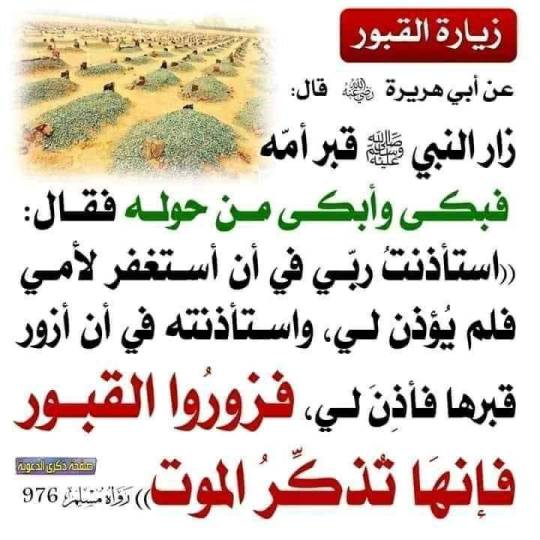
Abu Huraira (may Allah be pleased with him) reported that the Prophet (peace and blessings of Allaah be upon him) said:
زار النبي صلى الله عليه وسلم قبر أمه ، فبكى وأبكى من حوله ، فقال : استأذنت ربي في أن أستغفر لها ، فلم يؤذن لي ، واستأذنته في أن أزور قبرها فأذن لي ، فزوروا القبور فإنها تذكر الموت
“The Prophet (peace and blessings of Allaah be upon him) visited the grave of his mother, and he wept and those who were with him wept. Then he said, ‘I asked my Lord for permission to pray for forgiveness for her, and He did not grant me permission to do that, and I asked Him for permission to visit her grave, and He gave me permission. So visit the graves, for they are a reminder of death.’”
(Narrated by Ahmad, 2/441, 5/355, 359; Muslim, 2/671, no. 976; , 3/65; Abu Dawood, 3/557, no. 3234; 2/72; al-Nasaa’i, 4/90, no. 2034; 1/286; Ibn Maajah, 1/501, no. 1572; Ibn Abi Shaybah, 3/343; Ibn Hibbaan, 7/440, no. 3169; al-Haakim, 1/375-376, 376; al-Bayhaqi, 4/76).
2 notes
·
View notes
Text
Hadith relating to Al Masjid Al Aqsa
Below are a collection of hadith relating to Al Masjid Al Aqsa:
The Importance of Visiting Masjid Al-Aqsa
Abu Hurayrah (ra) relates that the Prophet (saw) said:
“Do not undertake a journey to visit any Mosque, but three: this Mosque of mine, the Mosque of al-Haram and the Mosque of Aqsa”[Sahih Muslim 1397]
Many similar Hadiths appear in Sahih Bukhari (Ref: 1189), Abu Dawud (Ref: 2033), An Nasa’i (Ref: 700) & Ibn Majah (Ref: 1409). There are also other narrations from Abu Sa’eed Al Khudri relating the same message in Tirmidhi (Ref: 326) and Ibn Majah (Ref: 1410).
Great Virtue in Praying at Masjid Al-Aqsa
Abu Darda (ra) relates that the Prophet (saw) said:
“A prayer in Makkah (Ka’bah) is worth 1000,000 times (reward), a prayer in my Masjid (Madinah) is worth 1,000 times, and a prayer in Al-Aqsa Sanctuary is worth 500 times more reward than anywhere else”[Bayhaqi]
Abu Dharr (may Allaah be pleased with him) said:
“We were discussing when we were with the Messenger of Allaah (peace and blessings of Allaah be upon him), which is better, the Mosque of the Messenger of Allaah (peace and blessings of Allaah be upon him) or Bayt al-Maqdis (Jerusalem). The Messenger of Allaah (peace and blessings of Allaah be upon him) said: “One prayer in my mosque is better than four prayers offered there (in Bayt al-Maqdis), and what a good place of prayer it is. Soon there will come a time when, if a man has a piece of land the size of a horse’s rope from which he can see Bayt al-Maqdis, that will be better for him than the whole world.”[ al-Haakim, 4/509]
Anas Ibn Malik (ra) relates that the Prophet (saw) said:
“A man’s prayer in his house is equal (in reward) to 1 prayer; his prayer in the mosque of the tribes is equal to 25 prayers; his prayer in the mosque in which Friday prayer is offered is equal to 500 prayers; his prayer in Aqsa Mosque is equal to 50,000 prayers; his prayer in my mosque is equal to 50,000 prayers; and his prayer in the Sacred Mosque is equal to 100,000 prayers.”[Ibn Majah – Daeef Hadith]
Abdullah Ibn Amr reports that the prophet (ﷺ) said:
“When Sulaiman bin Dawud finished building Baitil-Maqdis, he asked Allah for three things: judgment that was in harmony with His judgment, a dominion that no one after him would have, and that no one should come to this mosque, intending only to pray there, but he would emerge free of sin as the day his mother bore him.” The Prophet (ﷺ) said: “Two prayers were granted, and I hope that the third was also granted.”[Ibn Majah]
The Second House of Allah on Earth
Abu Dharr (ra) reported that he asked the Prophet (saw), “O Messenger of Allah, which mosque was first built on the surface of the earth?” He said, “Al- Masjid-ul-Haram (in Mecca).” I said, “Which was built next?” He replied “The mosque of Al-Aqsa ( in Jerusalem) .” I said, “What was the period of construction between the two?” He said, “Forty years.” He added, “Wherever (you may be, and) the prayer time becomes due, perform the prayer there, for the best thing is to do so (i.e. to offer the prayers in time)”[Sahih Bukhari 3366]
A similar Hadith is also narrated in Sahih Muslim (Ref: 520 a), and in Ibn Majah (Ref: 753).
The Importance of Donating to Masjid Al-Aqsa
Maymunah Bint Sa’d (ra) relates that she asked the Prophet (saw):
“O Messenger of Allah, tell us the legal injunction about (visiting) Bayt al-Muqaddas. The Messenger of Allah said: go and pray there. All the cities at that time were effected by war. If you cannot visit it and pray there, then send some oil to be used in the lamps.”[Abu Dawud]
The Virtues of Wearing Ihram From Masjid Al-Aqsa
Umm Salamah (ra) relates that the Prophet (saw) said:
“If anyone puts on Ihram for Hajj or Umrah from Masjid Al-Aqsa and then proceeds to the Sacred Masjid (Ka’bah), his past and future sins will be forgiven, or he will be guaranteed Paradise”.[Abu Dawud 1741 – Daeef Hadith]
The Blessed Land of Masjid Al-Aqsa
Zaid Ibn Thabit (ra) narrated:
“We were with the Messenger of Allah (saw) collecting the Qur’an on pieces of cloth, then the Messenger of Allah (saw) said: ‘Tuba [a prayer for glad tidings] ]is for Ash-Sham.’ So we said: ‘Why is that O Messenger of Allah?’ He said: ‘Because the angels of Ar-Rahman spread their wings over it.’”[Tirmidhi]
The First Qiblah
Al-Bara (ra) narrated that:
“We prayed toward Bait Al-Maqdis (Jerusalem) with the Messenger of Allah (ﷺ) for sixteen or seventeen months – Safwan was not sure – then it was changed to the Qiblah.”[An Nasa’i 488]
Al Isra Blessings For Ummah
Abu Hurayrah (ra) narrated that:
Allah’s Messenger (saw) was presented with two cups one containing wine and the other milk on the night of his night journey at Jerusalem. He looked at it and took the milk. Gabriel said, “Thanks to Allah Who guided you to the Fitra (i.e. Islam); if you had taken the wine, your followers would have gone astray.”[Bukhari vol 6, book 60, Hadith 232]
Ibn Mas’ud (May Allah be pleased with him) reported:
Messenger of Allah (ﷺ) said, “I met Ibrahim (ﷺ) on the Night of Ascension (Al-Asra), and he said to me: ‘O Muhammad, convey my greetings to your Ummah, and tell them that Jannah has a vast plain of pure soil and sweet water. It is a plain levelled land. The plants grow there by uttering: Subhan-Allah, Al-hamdu lillah, La ilaha illallah and Allahu Akbar (Allah is free from imperfection; praise be to Allah; there is no true god except Allah; and Allah is Greatest).”
[At- Tirmidhi]
Masjid Al-Aqsa – The Best Place of Residence
‘Abd Allaah bin ‘Amr said:
“ I heard the Apostle of Allaah (saw) say “There will be emigration after emigration and the people who are best will be those who cleave most closely to places which Abraham migrated [i.e. Jerusalem].”
[Abu Dawud – Daeef]
2 notes
·
View notes
Text
Allaah تعالى says:
(كَلاَّ بَلْ رَانَ عَلَى قُلُوبِهِمْ مَّا كَانُواْ يَكْسِبُونَ )
{Nay! But on their hearts is the Raan (covering) which they used to earn} 📚[Surah al-Mutaffifeen (83): 14]
Hadeeth 1️⃣
From Abu Umaamah bin Tha’labah رضي الله عنه who said: I heard the Messenger of Allaah صلى الله عليه وسلم say: “Whoever seizes the wealth of Muslim man with a false oath, then a black spot is placed in his heart, nothing will change it until the Day of Judgment.”
📚[Mustadrak al-Haakim (4/294) and graded as “Hasan” by Shaikh al-Albaanee in al-Saheehah (3364)]
Hadeeth 2️⃣
`Abdullaah ibn Unays al-Juhanee رضي الله عنه reported that Allaah’s Messenger صلى الله عليه وسلم said: “From the gravest of the major sins are to ascribe partner to Allaah; to displease parents; and take a false oath; and, if anyone swears an oath on Allaah, a firm oath introducing therein so much lie as a gnat’s wing then a spot is put in his heart till the Day of Resurrection.”
📚[Sunan al-Tirmidhee (3020) and graded as “Hasan” by Shaikh al-Albaanee]
Hadeeth 3️⃣
Narrated Abu Hurairah رضي الله عنه that the Prophet صلى الله عليه وسلم said: “Verily, when the servant commits a sin, a black spot appears in his heart. If he repents from it, his heart is polished clean. However, if he increases (in the sin), the spot will continue to increase. That is the statement of Allaah: {Nay! But on their hearts is the Ran (covering) which they used to earn}” [Surah al-Mutaffifeen (83): 14]
📚[Sunan al-Tirmidhee (3334), Sunan Ibn Maajah (3441) and graded as “Hasan” by Shaikh al-Albaanee. Also graded as “Hasan” by Shaikh Muqbil in Saheeh al-Musnad (1355, 1449)]
Hadeeth 4️⃣
Narrated Abu Hurairah رضي الله عنه that the Prophet صلى الله عليه وسلم said: “Whenever the servant commits a wrong, a black spot is put in his heart. So, if he refrains from it, seeks forgiveness and repents, his heart is polished clean. But if he returns to the sin, the spot will increase until it overcomes his (entire) heart, and this is the Raan that Allaah mentions when He says: {Nay, but on their hearts is the Ran (covering) which they used to earn}."
📚[al-Nasa’ee in al-Kubraa (10179, 11594) and graded as “Hasan” by Shaikh al-Albaanee in Saheeh al-Mawaarid (1483, 2075)]
7 notes
·
View notes
Text
Salaat-ud-Duhaa is charity due on the believer and it is the Salaah of The Repentant
عَنْ أَبِي ذَرٍّ رضي الله عنه، عَنِ النَّبِيِّ صلى الله عليه وسلم أَنَّهُ قَالَ:
"يُصْبِحُ عَلَى كُلِّ سُلاَمَى مِنْ أَحَدِكُمْ صَدَقَةٌ. فَكُلُّ تَسْبِيحَةٍ صَدَقَةٌ وَكُلُّ تَحْمِيدَةٍ صَدَقَةٌ وَكُلُّ تَهْلِيلَةٍ صَدَقَةٌ وَكُلُّ تَكْبِيرَةٍ صَدَقَةٌ. وَأَمْرٌ بِالْمَعْرُوفِ صَدَقَةٌ وَنَهْىٌ عَنِ الْمُنْكَرِ صَدَقَةٌ. وَيُجْزِئُ مِنْ ذَلِكَ رَكْعَتَانِ يَرْكَعُهُمَا مِنَ الضُّحَى".
Narrated Abu Dharr (radhiyallaahu anhu) that Allaah's Messenger (ﷺ) said:
"In the morning charity is due from every bone in the body of every one of you. So every glorification of Allaah (tasbeeh) is a charity. And every praise of Him (tahmeed) is a charity. And every utterance of His Deification (tahleel) is a charity. And every profession of His Greatness (takbeer) is a charity. Enjoining good is an act of charity and forbidding what is bad is an act of charity.
And two raka'aat which one prays in the forenoon will suffice for it".
(Sahih Muslim)
عن مُعَاذَةَ الْعَدَوِيَّةَ، عَنْ عَائِشَةَ (رضي الله عنها)، قَالَتْ:
"كَانَ رَسُولُ اللَّهِ صلى الله عليه وسلم يُصَلِّي الضُّحَى أَرْبَعًا وَيَزِيدُ مَا شَاءَ اللَّهُ ."
Mu'aadhah al'Adawiyya reported that 'Aa'isha (radhiyallaahu anhaa) said :
"The Messenger of Allaah (ﷺ) used to observe four raka'aat in the forenoon prayer and he would sometimes increase, as Allaah willed".
(Sahih Muslim)
عن أبي هريرة رضي الله عنه، عن النبي صلى الله عليه وسلم قال:
"لا يُحَافِظُ على صلاةِ الضُّحَى إلا أَوَّابٌ وهي صلاةُ الأَوَّابِينَ".
Narrated Abu Hurairah (radhiyallaahu anhu) that The Prophet (ﷺ) said:
"No one preserves the forenoon prayer except the one who is repentant. And it is the prayer of al-Awwaabeen (the repentant)".
(Al-Haakim, Sahih al-Jaami')
The preferred time for Salat-ud Duhaa is late morning when the sun heats up the ground
Abu ilhaam. Sheikh Jameel Adams .
#islam#islamicquotes#welcome to islam#manhaj salaf#salaffiyah#sayings of the salaf#salafushalih#hadith#quran#salaf#sunnah#dawah
14 notes
·
View notes
Text
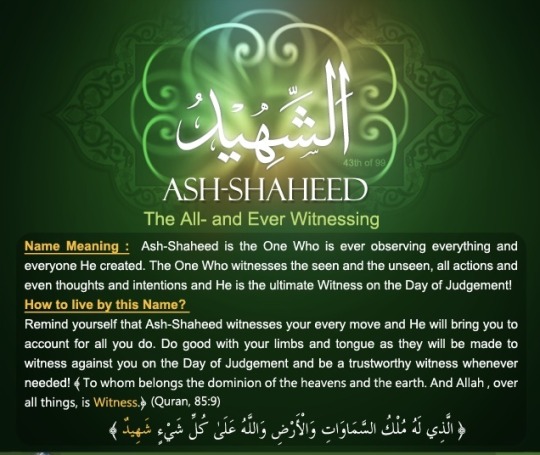
Allah calls Himself Ash-Shaheed— The All-and-Ever Witnessing— on 18 occasions in the Quran. Ash-Shaheed is the witness whose sight no one can escape. He is the One with full knowledge of all matters, witnessing the apparent and hidden, anywhere, any time. Ash-Shaheed is the witness and observer of all creation, thoughts, and actions, and the ultimate witness on the Day of Judgment!
The Witness, the Testifier, the Certifier
Shaheed comes from the root sheen-haa-daal, which points to three main meanings. The first meaning is “to bear witness.” The second meaning is to offer testimony, and the third is to have knowledge of something.
This root appears 160 times in the Quran in nine derived forms. Examples of these forms include yashhadu (“to testify”), ashhidoo (“to take witness”), shahaadati (“the seen”) and shuhadaa (“witnesses, martyrs”).
Shaheed refers to Allah’s awareness of everything; He hears every sound, loud and quiet, and sees the small and the large. In addition, He is the One who will testify for or against His servants for their deeds.
Ash-Shaheed Himself says:
Say: What thing is the greatest witness? Say: Allah is shaheed between you and I; this Qur’an has been revealed to me that I may warn therewith – you and whomsoever it may reach. [Quran, 6:19]
Allah is Witness over all things. [Quran, 58: 6] Allah is sufficient as Witness. [Quran, 4: 79]
Allah (Himself) is Witness that there is no god save Him. And the angels and the people of knowledge (too are witnesses). [Quran, 3:18]
A Scene of the Souls
When Allah created Adam, He wiped Adam’s back and every person that He will create from him until the Day of Resurrection fell out from his back. [At-Tirmidhi and Al-Haakim] Allah stated that He brought the descendants of Adam out of their fathers’ loins, and they testified against themselves that Allah is their Lord and King and that there is no deity worthy of worship except Him. Allah then said,(and made them testify as to themselves (saying): “Am I not your Lord” They said: “Yes!”) [Tafseer ibn Katheer]
This was your first testimony and it means we will have no excuse on the Day of Judgement!
It will be said to a man from the people of the Fire on the Day of Resurrection, “If you owned all that is on the earth, would you pay it as ransom’ He will reply, `Yes.’ Allah will say, `I ordered you with what is less than that, when you were still in Adam’s loins, that is, associate none with Me (in worship). You insisted that you associate with Me (in worship).” [Tafseer ibn Katheer]
How Can You Live By This Name?
1. Say the sahahda, live the shahada. The Prophet salallahu ‘alayhi wa sallam said: Man shahida an la ilaha illallah dakhala al-jannah – Whoever witnesses that there is no god but Allah alone enters Paradise.[Saheeh Muslim]. Your testimony of faith in Allah is something you not only utter, but must live by. When you say I bear witness there is no god but Allah it means that in your talk and actions, in your house or outside you show that you love Allah more than anyone else, you accept Him as your Creator, Master and Ruler of the universe, that you worship Him alone in all matters and not your desires or others’ directions. Next time when you say the shahada in your prayer, reflect upon the meaning. Increase in saying la ilaha illallah to renew your emaan!
2. Trust in Ash-Shaheed. Ash-Shaheed says in this beautiful soothing ayah: So wait patiently for your Lord’s decree, for surely you are in Our sight. [Quran, 52: 48] Rest assured that any unjust treatment by the hands of others you go through, slander, gossip or abuse, Ash-Shaheed is your Witness and you will get justice.
3. Remember that you are a servant. It’s sometimes easy to shout at your family or children inside the house, or even oppress someone when you are in a position of authority over them. Remind yourself in each situation, wherever you are, whoever you talk to, whatever position you have, that you are a servant of Allah. Ash-Shaheed is witnessing every step you take and will you to account. Use this tip: when you are about to do something wrong, look up at the sky and imagine Ash-Shaheed watching you!
4. Don’t make your limbs testify against you. Use your tongue for speech beloved by Ash-Shaheed, your eyes to read the Quran, your limbs to pray to Him as they will all testify as what you used them for! The Prophet salallahu ‘alayhi wa sallam said: I was amazed at how a servant will dispute with his Lord on the Day of Resurrection. He will say, “My Lord, did You not promise me that you would not treat me unjustly” Allah will say, “Yes.” The man will say, “I will not accept any witness against me except from myself.” Allah will say, “Is it not sufficient that I and the angels, the noble scribes, are witnesses” These words will be repeated several times, then a seal will be placed over his mouth and his organs (or limbs) will speak about what he used to do. Then he will say, “Away with you! It was only for your sake that I was arguing!”)” [Muslim and An-Nasa’i]
5. Always stand up for the truth. Always stand up for the truth in your testimonies, even if it is against yourself! Sometimes it is hard to admit a mistake, or testifying for the truth might even endanger you, but know this characteristic is one of true honour of a believer, which earns you not just a place in Paradise, but a place of honour! And those who are in their testimonies upright and those who [carefully] maintain their prayer: they will be in gardens, honoured. [Quran, 70:33-35]
Wallahu ta’alaa ‘alem.
O Allah, Ash-Shaheed, we know that You witness all things. Guide us to live by the shahada and make us utter the testimony of faith on our deathbed. Help us remember that You are witnessing us, and make this awareness an inspiration for us to increase our good deeds. Make us always stand up for the truth and join us with the prophets and shuhadaa in the highest Paradise, ameen!
#allah#islam#revert help team#asma al husna#revert help#muslim#ayat#daily#allah’s name#dua#pray#prayer#salah#muslimah#hijab#religion#reminder#mohammed#new muslim#new revert#new convert#how to convert islam#convert help#convert islam#become a muslim#welcome to islam#hadith#daily ayat#prophet#god
12 notes
·
View notes
Text
The Prophet ﷺ said:
“The hour is drawing ever closer,
and people are only becoming ever keener
on obtaining the pleasures of this worldly life,
and ever more distant from Allah.”
[Al-Haakim, Saheeh al-Jaami', 1146]
16 notes
·
View notes
Text


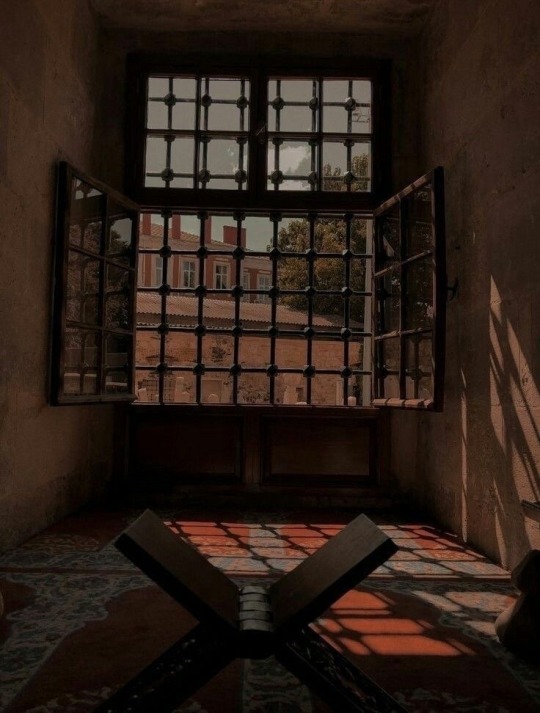

Khushoo’ in Salah
(part 3)
The means of developing Khushoo'
1. Striving to gain that which gives and strengthens khushoo’. This can be achieved in several ways, such as the following:
Preparing oneself for prayer properly
For example:
a. By repeating the words of the adhaan after the muezzin;
b. By pronouncing the dua to be recited after the adhaan
c. Reciting dua between the adhaan and the iqaamah;
d. Doing wudoo properly, saying Bismillaah before it and making dhikr and saying the dua after it,
e. Using siwaak to cleanse and perfume the mouth that is going to recite Quran in a short while
f. Wearing one’s best and cleanest clothes,
g. We should also prepare ourselves by covering our awrah properly, purifying the spot where we are going to pray, getting ready early and waiting for the prayer, and making the rows straight and solid, without any gaps, because the shayaateen come in through the gaps in the rows.
2. Moving at a measured pace during prayer:
The Prophet ﷺ used to move at a measured pace during salaah, allowing every bone to return to its place.
Abu Qutaadah (رضي اللّٰه عنه ) said: “The Prophet ﷺ said: “The worst type of thief is the one who steals from his prayer.” He said, “O Messenger of Allah, how can a person steal from his prayer?‟ He said, “By not doing rukoo and sujood properly.” (Reported by Ahmad and al-Haakim, 1/229; Saheeh al-Jaami‟, 997).
The one who does not move at a measured pace in his prayer cannot have khushoo because haste is a barrier to khushoo and pecking like a crow is a barrier to reward.
3. Remembering death whilst praying:
The Prophet ﷺ said: “Remember death in your prayer, for the man who remembers death during his prayer is bound to pray properly, and pray the prayer of a man who does not think that he will pray any other prayer.” (al-Silsilat al-Sahihah by al-Albaani, 1421.)
The Prophet ﷺ also advised Abu Ayub (رضي اللّٰه عنه): “When you stand up to pray, pray a farewell prayer.” (Reported by Ahmad, 5/412; Saheeh al-Jaami‟, no. 742) – meaning the prayer of one who thinks that he will not pray another prayer. The person who is praying will no doubt die, and there is some prayer that will be his last prayer, so let him have khushoo’ in the prayer that he is doing, for he does not know whether this will be his last prayer.
Source: 33 Ways of developing Khushoo' in Salaah by Sheikh Muhammed Salih Al-Munajjid
#islam#islamic#muslim#convert to islam#ahlussunnahwaljamaah#ahlusunnah#salafi#life#salafushalih#sayings of the salaf#makkahalmukarramah#makkah#madinahalmunawwarah#madinah#manhaj salaf#manhaj#masjid al haram#masjid al aqsa#masjidalnabawi#masjid#ramadaan#ramadan#islamic reminders#islamicquotes
5 notes
·
View notes
Text
Al-Quds, Jerusalem below, on which many of the true dreams related by the duāt in Palestine and Bilād al-Maghrib converge
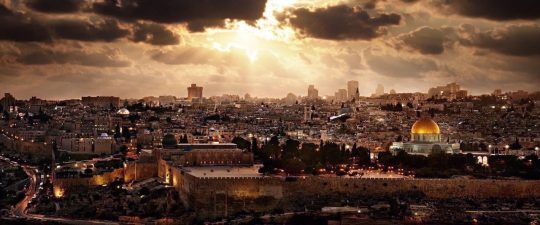
True Dreams of the Believers - series on fitan (trials/tribulations) of Ākhirul Zamān - End times
Some of the dreams relate events that will involve the figure of as-Sufyānī, which is problematic, given that the ahadīth around as-Sufyānī are judged dha'īf - weak for the most at least. One sheikh recently went through all the ahadīth and reiterates this fact, and gives further detail : the majority of the ahadīth indeed are dha'īf and so there isn't much benefit in mentioning them, but there is one Hadīth that is worth mentioning and that's the one reported by al-Hākim, on the authority of Abū Hurairah, may Allāh be pleased with him.
عَنْ أَبِي هُرَيْرَةَ رَضِيَ اللَّهُ عَنْهُ، قَالَ: قَالَ رَسُولُ اللَّهِ صَلَّى اللهُ عَلَيْهِ وَسَلَّمَ: "يَخْرُجُ رَجُلٌ يُقَالُ لَهُ: السُّفْيَانِيُّ فِي عُمْقِ دِمَشْقَ، وَعَامَّةُ مَنْ يَتْبَعُهُ مِنْ كَلْبِ، فَيَقْتُلُ حَتَّى يَبْقَرَ بُطُونَ النِّسَاءِ، وَيَقْتُلُ الصِّبْيَانَ، فَتَجْمَعُ لَهُمْ قَيْسٌ فَيَقْتُلُهَا حَتَّى لَا يُمْنَعُ ذَنَبُ تَلْعَةٍ، وَيَخْرُجُ رَجُلٌ مِنْ أَهْلِ بَيْتِي فِي الْحَرَّةِ فَيَبْلُغُ السُّفْيَانِيَّ، فَيَبْعَثُ إِلَيْهِ جُنْدًا مِنْ جُنْدِهِ فَيَهْزِمُهُمْ، فَيَسِيرُ إِلَيْهِ السُّفْيَانِيُّ بِمَنْ مَعَهُ حَتَّى إِذَا صَارَ بِبَيْدَاءَ مِنَ الْأَرْضِ خُسِفَ بِهِمْ، فَلَا يَنْجُو مِنْهُمْ إِلَّا الْمُخْبِرُ عَنْهُمْ".
المستدرك على الصحيحين للحاكم (4/ 565) (8586)،
(Al Mustadrak on the criteria of as-Sahīhayn by al-Hākim)
Abu Hurayrah narrated that the Prophet (blessings and peace of Allah be upon him) said: “There will emerge a man called as-Sufyaani from the depths of Damascus, and most of those who follow him will be from (the tribe of) Kalb. He will kill many people until he rips open the bellies of women and kill children. (The tribe of) Qays will gather against him and he will kill them. A man from my family will emerge in the harrah, and news of that will reach as-Sufyaani. He will send troops against him and he will defeat them. Then as-Sufyaani will march towards him accompanied by those who are with him, then when he is in a plain, they will be swallowed up by the earth and none of them will be saved except the one who will tell others about them.” al-Mustadrak.
Shaykh Ibn ‘Uthaymeen (may Allah have mercy on him) said:
The hadith of as-Sufyānī was narrated by al-Hākim in his Mustadrak, and he said that its isnaad (chain of narration) is saheeh. But al-Haakim (may Allah have mercy on him) was known to be lenient in accepting hadiths as saheeh. End quote.
Majmoo‘ Fataawa Ibn ‘Utahymeen (2/62)
And Allah knows best.
4 notes
·
View notes
Text
The Prophet Muhammad (ﷺ) said:
“Faith wears out in the heart of any one of you just as clothes wear out, so ask Allaah to renew the faith in your hearts.”
{Reported by Al-Haakim in Al-Mustadrak, ¼. As-Silsilah As-Saheehah, 1585}
3 notes
·
View notes
Text
Once a blind person came to Rasulullah sallallaahu alayhi wasallam and said, ‘Ya Rasulallah! “Ask Allah to cure me.’ Rasulullah sallallaahu alayhi wasallam replied, ‘If you wish I will make Du’aa otherwise you may be patient and this is better for you.’ The man said, ‘Make Du’aa’. Rasulullah sallallaahu alayhi wasallam then commanded him to make Wudhu properly, perform two rakats salah and then he recite the following Du’aa,
“اللَّهُمَّ إِنِّي أَسْأَلُكَ، وَأَتَوَجَّهُ إِلَيْكَ بِنَبِيِّكَ مُحَمَّدٍ نَبِيِّ الرَّحْمَةِ، يَا مُحَمَّدُ، إِنِّي تَوَجَّهْتُ بِكَ إِلَى رَبِّي فِي حَاجَتِي هَذِهِ، فَتَقْضِي لِي، اللَّهُمَّ شَفِّعْهُ فِيَّ”
‘Oh Allah, verily, I ask of you and I turn to you through your prophet Muhammad, the prophet of mercy sallallaahu alayhi wasallam, O Muhammad, verily, I have turned to my Lord through you so that my need be fulfilled. Oh Allah, accept his intercession on my behalf and fulfil my need.”
(Musnad Ahmad vol.4 pg.138; Sunan Tirmidhi; Sunan ibn Majah; Mustadrak Haakim and others). Imaam Tirmidhi, ibn Khuzaymah and Haakim have classified this Hadith as authentic.
The words, ‘I turn to you through your Prophet’ clearly prove tawassul through the position of a person. Rasulullah sallallaahu alayhi wasallam also told him that he should make the same supplication whenever he needed to. (al-Raddul Muhkamul Mateen pg.145)
#islam#quran#islamic#muslim#pakistan#islamicquotes#islamic group#muslim community#muslim countries#istanbul#islamicpost#islamicreminder#hadith#muslim ummah#makkah#muslimah#alhamdulillah#allah#jannah#instagram
9 notes
·
View notes
Text
The Prophet ﷺ said:
“The hour is drawing ever closer,
and people are only becoming ever keener on obtaining the pleasures of this worldly life,
and ever more distant from Allah.”
[Al-Haakim, Saheeh al-Jaami', 1146]
11 notes
·
View notes